Search Engine Marketing is a variety of techniques and strategies that a company can employ to increase visitor traffic to a website from search engine results pages (SERPS). SEM’s goal is to increase a website’s visibility through paid search, contextual advertising, and organic search rankings.
Performance marketing, on the other hand, aims to improve the company’s overall performance. Rather than only paying the marketing agency when a specific product is sold, the retailer pays only when the affiliate achieves the desired result, which is the campaign’s goal.
What Is Search Engine Marketing?
Search engine marketing is marketing a business using paid advertisements that appear on search engine results pages (SERPs).
Some advertisers bid on keywords. They are users of services such as Google and Bing. This is an opportunity for advertisers to get a chance to appear in the results of queries searched by people. These ads are known by the term, pay-per-click ads.
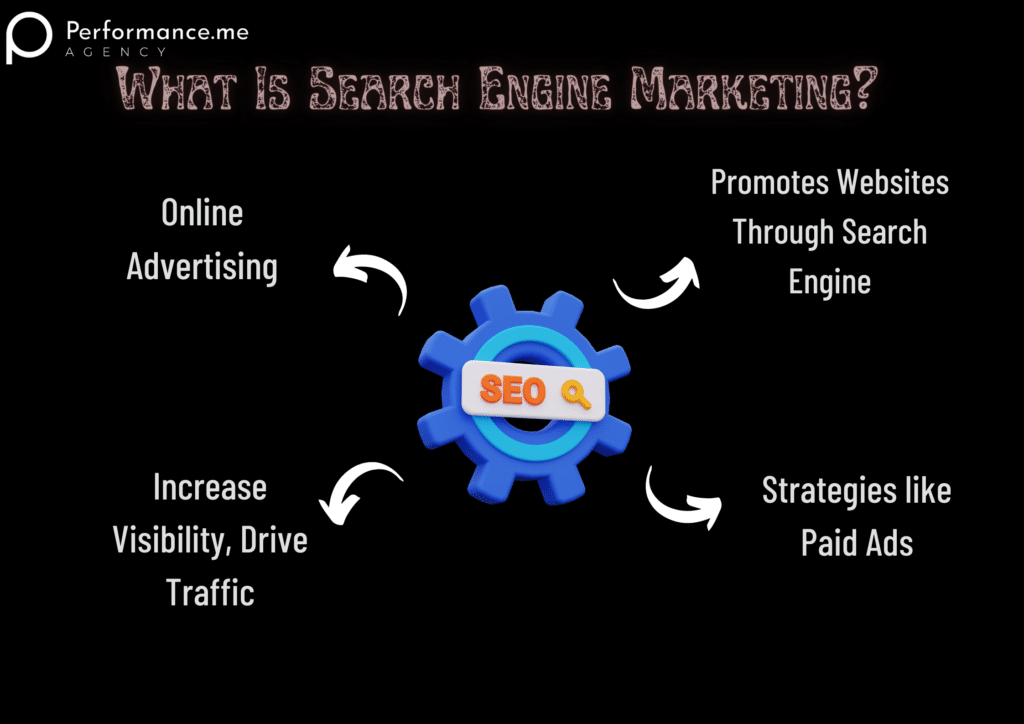
There are a variety of ad formats: text-based ads, product listing ads, and visual ads. There is an advantage in visual ads, which allows the consumers to see important information at a glance, such as price and reviews.
There are two main ways to show your website in top results.
Naturally occurring results are typically displayed in the search results page’s center, and chosen by Google’s algorithm. This algorithm evaluates the website’s relevance and authority.
Paid results appear at the top of the search results page but in a column to the right. Unlike organic results, advertisers must pay a fee for each click on these ads. Platforms such as Google Ads must be used to purchase advertising space on search engines.
12 Key Concepts of Search Engine Marketing:
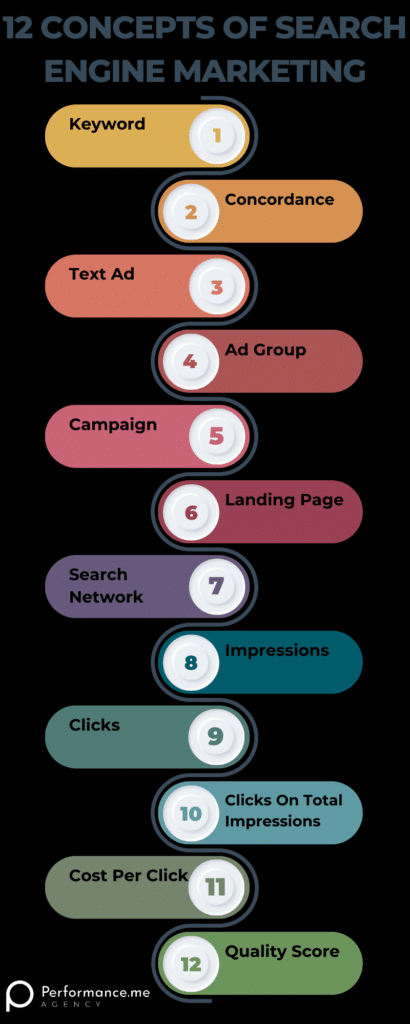
Keywords associated with your page are what trigger users to find your site when they perform a search for a specific item or information.
- Concordance: When creating a marketing strategy in Google Ads, you must define the degree of connection between the keywords you’ve chosen and the terms people use when typing a search term into a search engine. This is referred to as “concordance.” For example: If you choose a broad match, the ad will appear when the user searches for synonyms or terms similar to that broad match keyword.
- Text ad: This is the most common type of ad displayed in search engines, though other options are now available, such as shopping ads. Text ads typically include a title, a visible URL that can be customized, and a brief description.
- Ad group: In Google Ads, an ad group is a collection of ads that use the same keywords. This allows you to determine which ones are the most effective.
- Campaign: A campaign in Google Ads is similar to a “framework” in which various ad groups with similar goals are organized. For example, if you purchase notebooks online, each campaign might include the ad group for textbooks, another for backpacks, and a third for drawing supplies.
- Landing page: This is the web page to which a user is directed after clicking on an advertisement. This page must be optimized for conversions and prompting users to take particular actions in order to achieve good results with search engine marketing. To ensure a good user experience, the keywords, the displayed ad, and the landing page should all be in sync.
- Search Network: This is where your ads will appear. The most common placement is at the top and right of the results page, but they can also be displayed on other websites such as YouTube.
- Impressions: The number of times an advertisement was shown.
- Clicks: The number of times an ad has been clicked.
- CTR: The percentage of Clicks on Total Impressions.
- CPC: Cost Per Click.
Quality Score: This is the rating that Google assigns to advertisements and keywords, which influences your cost per click (CPC). The relevance of the ad, the percentage of clicks obtained, and the experience of the landing page all contribute to this score. The goal of this system is for higher-quality ads to rank higher and have a lower cost per click.
6 Benefits of Search Engine Marketing:
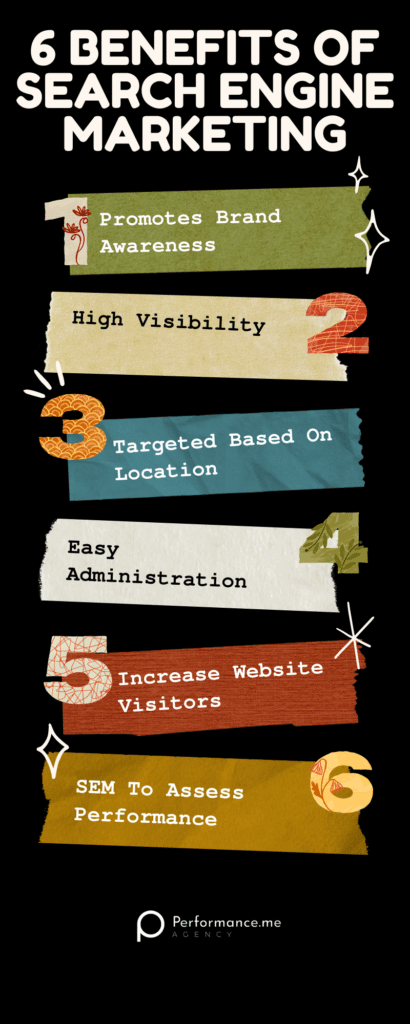
1. Promotes Brand Awareness
Paid ads used in search engine marketing can help your brand stand out from the crowd. These ads, whether the headline or the URL link, can leave a lasting impression on customers’ perceptions of your brand.
When blended with other forms of brand awareness, it can gradually or quickly put you on the radar of your target audiences. If you’re looking for other ways to raise brand awareness for your company, check out our guide here.
2. High Visibility
It takes time and effort to increase visibility through organic SEO. Search engine marketing, on the other hand, yields almost immediate results. When a potential customer searches for you, your ad appears in front of them. As a result, it is an excellent short-term strategy for rapidly increasing visibility for your products, services, or organization, even if they don’t click on it.
3. Targeted Based on Location
Another significant advantage of SEM is that you can limit your ads to people close to your business. This allows you to eliminate searchers who are too far away from your location.
It also assists in connecting you with people in your area. Local audiences are eager to learn about local businesses.
4. Easy Administration
Another appealing feature of search engine marketing is its simplicity. Platforms such as Google Ads make it simple to create and manage any ads that you use with the service.
5. Increase Website Visitors
When users search for relevant interests, the ads for your website are frequently the first thing they see. If your ad copy is effective, it has the potential to drive traffic to your website.
This is especially useful if you’ve struggled to generate organic traffic through SEO. Paid advertisements, when used correctly, can help supplement traffic until you can generate it more naturally on your own.
6. SEM to Assess Performance
Measuring the effectiveness of advertising campaigns in real life is frequently a difficult and expensive experience. Surveys, focus groups, and other similar metrics are required. Fortunately, SEM platforms such as Google Ads provide instant access to information such as top-performing keywords, impressions, and click-through rates.
This is one of the most significant advantages of SEM over traditional advertising. These tools allow you to track the effectiveness of your advertisements. If you notice that one ad performs better than another, you can quickly adjust your strategy and run more effective search engine advertisements.
How Does Search Engine Marketing Relate to Performance Marketing?
Search engine marketing is an essential element of performance marketing that is well worth the time and effort.
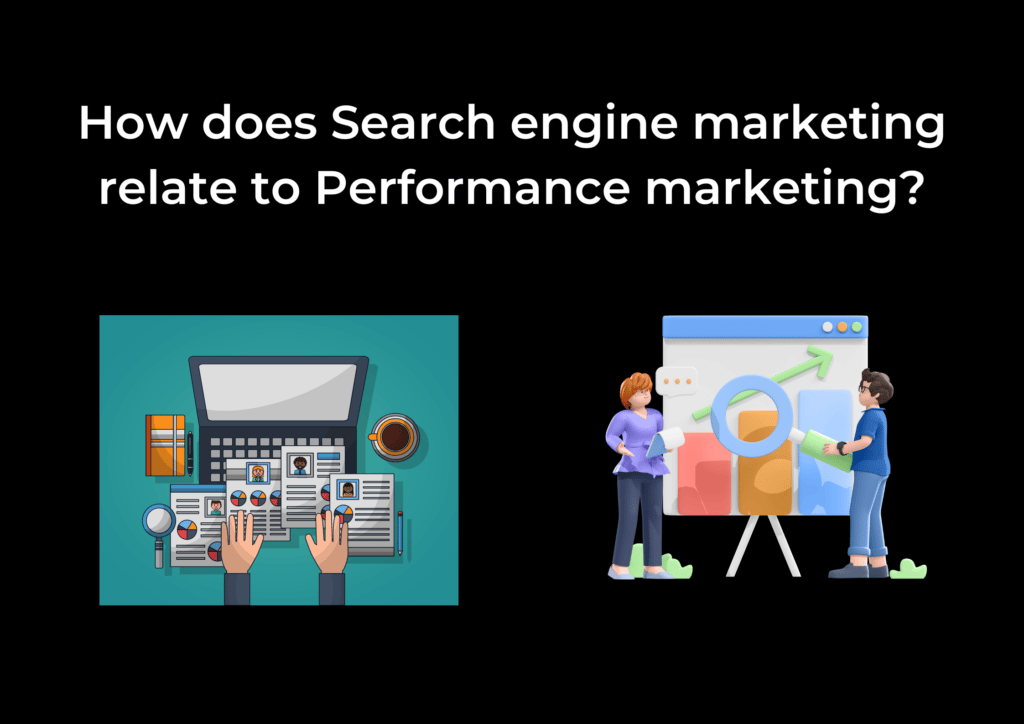
| Search Engine Marketing (SEM) | Performance Marketing |
| SEO is a structure of digital marketing that particularly focuses on marketing websites by increasing their visibility in search engine results pages (SERPs) through paid advertising. | A broader marketing strategy that encompasses various tactics aimed at driving measurable results and achieving specific business goals. |
| SEM primarily involves pay-per-click (PPC) advertising, where advertisers bid on keywords related to their products or services to display their ads in search engine results. | Performance marketing goes beyond just driving traffic and focuses on achieving specific objectives, such as generating leads or sales and optimizing campaigns to maximize the desired outcomes. |
| SEM campaigns often target specific keywords and demographics to reach a relevant audience actively searching for related products or services. | Performance marketing takes a data-driven approach, utilizing analytics and tracking tools to measure and optimize campaigns for maximum performance and return on investment (ROI). |
| SEM is primarily concerned with driving traffic to websites and generating immediate visibility and clicks. | Performance marketing goes beyond just driving traffic and focuses on achieving specific objectives, such as generating leads or sales, and optimizing campaigns to maximize the desired outcomes. |
| Key metrics in SEM include click-through rate (CTR), cost per click (CPC), and conversion rate (CR). | Key metrics in performance marketing include return on ad spend (ROAS), cost per acquisition (CPA), customer lifetime value (CLTV), and overall return on investment (ROI). |
| SEM can be a subset of performance marketing, as it contributes to driving measurable results and can be integrated into a broader performance-based marketing strategy. | Performance marketing encompasses various channels and tactics beyond SEM, such as affiliate marketing, email marketing, social media advertising, and more, to achieve overall business objectives. |
Performance marketing aims to improve the company’s overall performance. Rather than only paying the marketing agency when a specific product is sold, the retailer pays only when the affiliate achieves the desired result, which is the campaign’s goal.
Frequently Asked Questions
1. Which costs more, SEM or Performance Marketing?
SEM costs more because the company spends money on the following aspects:
1. Your ad spends’ budget
2. Your SEM agency
3. Your advertising strategy
4. Your campaign’s scale
2. How do I guarantee localized search results?
The localized search page has a custom search home page, which enables you to change the search engine as you want.
You use them by following the below list:
1. Click setup
2. Click basic tab
3. Select your desired country or region.
3. What tools can I use to do SEM and Performance Marketing?
1. Google Keyword Planner
2. SpyFu
3. DataFeedWatch
4. WordStream
5. Optmizely
6. SEMrush
Wrapping Up
In today’s marketing world, Search engine marketing, and performance marketing are increasingly evolving day by day. We hope that this article resolved the feeling of thirst by gaining more knowledge in both marketing aspects.
Please feel free to offer comments on your experience of using the key concepts of search engine marketing and the benefits harvested.
If You Liked This Article, You Might Like These:

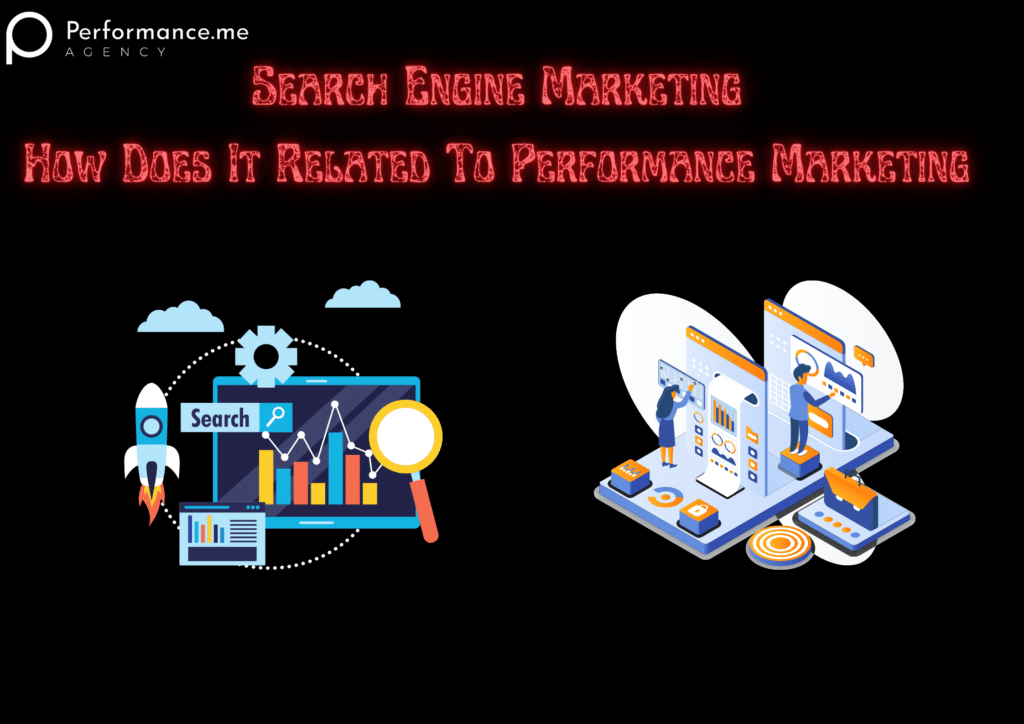
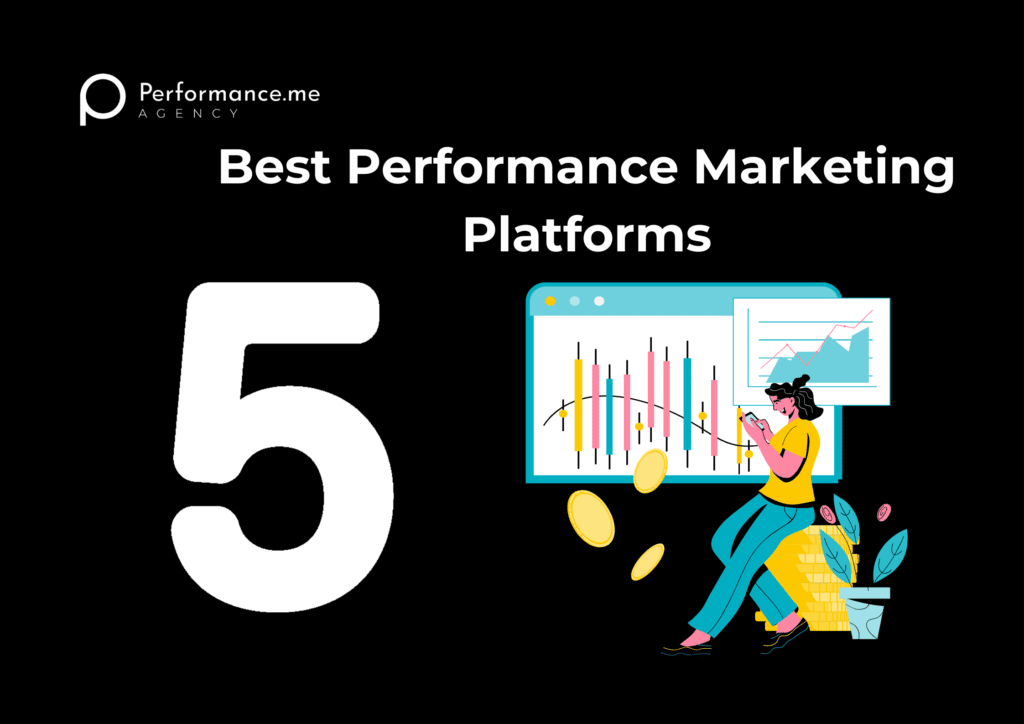
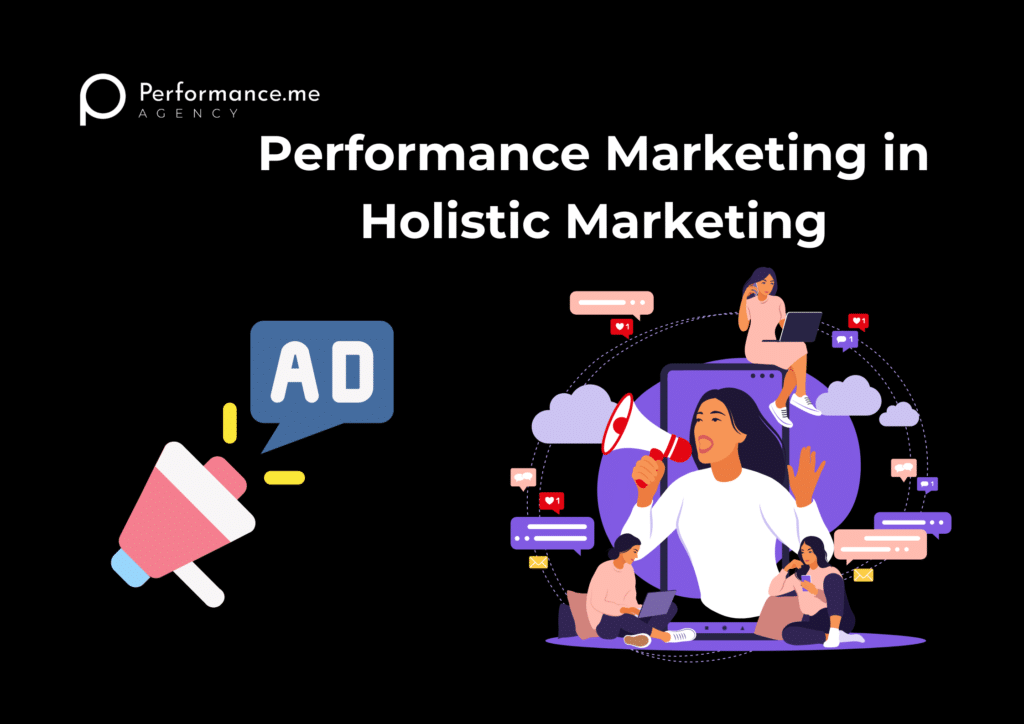
Do you mind if I quote a couple of your articles as long asI provide credit and sources back to your website?My blog site is in the very same niche as yours and my users would certainly benefit from some of the information you present here.Please let me know if this okay with you. Thanks!
As long as you give credit we don’t mind at all. We appreciate your interest.